A missed period is one of the most common early signs of pregnancy discharge, but it’s not the only one. If you think you might be pregnant, Early sign of pregnancy discharge urine it’s important to listen to your body and know what to look out for.
The two-week wait between trying to conceive and taking a pregnancy test can be understandably anxiety inducing, and it’s perfectly normal to be scanning your body for signals you could be pregnant. On the other hand, Early sign of pregnancy in 1 week perhaps you’ve noticed some unusual symptoms, and you’re feeling worried it might be a poorly timed pregnancy. Either way, being equipped with as much knowledge as possible can hopefully help to reassure you.
Below, an obstetrician and gynecologist explain the early signs of pregnancy discharge to be aware of. As well as when to take a pregnancy test or what else could be causing your symptoms. So, early sign of pregnancy urine whether you’re in the midst of anxiety over the two-week wait or feeling concerned about any symptoms, here’s all the information you need to know. Don’t forget you can also use our pregnancy test calculator to help you decide whether it’s time to take a pregnancy test or not.
How early can you show the first signs of pregnancy?
First things first: how early can you show signs of pregnancy? The answer will vary from person to person, but women and people who menstruate can expect to experience very early pregnancy symptoms around two or three weeks after ovulation if conception occurred. Some people may experience the signs earlier. How early sign of pregnancy discharge, urine while others might not experience a single symptom until a missed period. “Sometimes early sign of pregnancy urine it could be a little earlier or a little later, early sign of pregnancy in 1 week but most of the time it’s around the four- to five-week mark [since the first day of your last period] that you start to feel signs,” explains Dr. Charlsie Celestine, obstetrician and gynecologist, New Jersey, US.
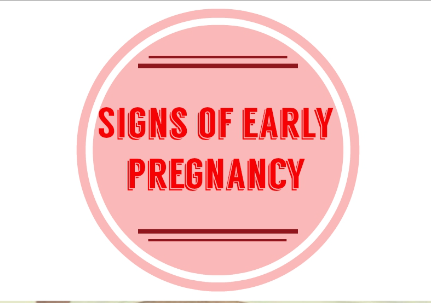
Spotting and Cramping
After conception, the fertilized egg attaches itself to wall of the uterus. This can cause one of the earliest signs of pregnancy — spotting and, sometimes, cramping.
That’s called implantation bleeding. It occurs anywhere from six to 12 days after the egg is fertilized.
The cramps resemble menstrual cramps, so some women mistake them and the bleeding for the start of their period. The bleeding and cramps, however, are slight.
Besides bleeding, a woman may notice a white, milky discharge from their vagina. That’s related to the thickening of the vagina’s walls, which starts almost immediately after conception. The increased growth of cells lining the vagina causes the discharge.
This discharge, which can continue throughout pregnancy, is typically harmless and doesn’t require treatment. But if there is a bad smell related to the early sign of pregnancy in 1 week discharge or a burning and itching sensation, tell your doctor so they can check on whether you have a yeast or bacterial infection or STD.
The term “spotting” usually refers to light bleeding that happens outside of your normal period. While this might be an alarming symptom to experience, it’s not necessarily a cause for concern. Spotting in early pregnancy can be due to implantation bleeding, which is perfectly normal and can occur when the embryo implants itself into the wall of the uterus, usually around 10 to 14 days after conception.
Spotting is also common in the first trimester of a pregnancy, with around 25% of pregnant women experiencing bleeding in the first 12 weeks of their pregnancy.
Dr. Celestine advises anyone experiencing this kind of “abnormal period” to take a pregnancy test. If it’s positive, she says it’s a good idea to monitor the bleeding. Implantation bleeding typically lasts for one to two days and is very light. How early sign of pregnancy discharge, urine it’s usually not enough to need any more protection than a panty liner. Unfortunately, bleeding any more than this can sometimes be a sign of a miscarriage or an ectopic pregnancy. As scary as this sounds, try not to panic; one study found that one in four pregnant people reported bleeding, but only around 1 in 10 women (12%) who experienced bleeding had a miscarriage.
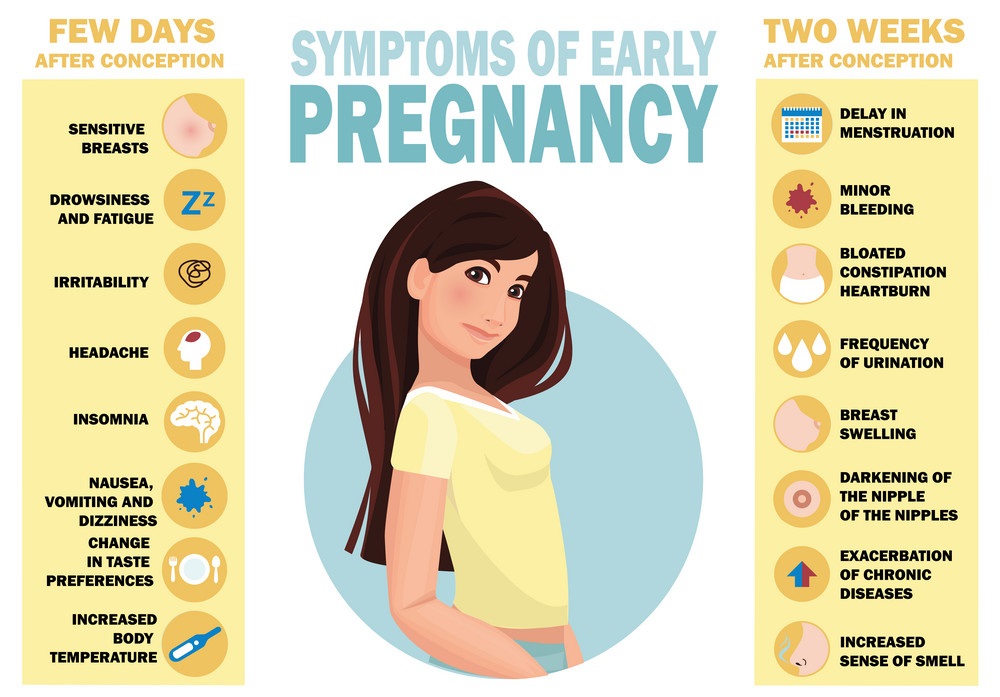
Breast Changes
Breast changes are another very early sign of pregnancy discharge. A woman’s hormone levels rapidly change after conception. Because of the changes, their breasts may become swollen, sore, or tingly a week or two later. Or they may feel heavier or fuller or feel tender to the touch. The area around the nipples, called the areola, may also darken.
Other things could cause breast changes. But if the changes are an early symptom of pregnancy, keep in mind that it is going to take several weeks to get used to the new levels of hormones. But when it does, breast pain should ease up.
You might also be able to spot the very early signs of pregnancy through how your breasts feel. According to one study, 76.2% of women experienced early sign of pregnancy in 1 week breast pain or tenderness in the first trimester. Breast tenderness can occur from a few days to one to two weeks after conception and is caused by the change in hormones in your body that occur during a pregnancy.
This might be an early sign of pregnancy discharge, urine before a missed period, as you can experience it as early on in your pregnancy as one or two weeks after conception. “It’s different for everyone, and some people don’t get it all,” says Dr. Celestine. “It’s caused by an increase in both estrogen and progesterone in pregnancy.
Fatigue
Hands up if you feel absolutely exhausted! Dr. Celestine says that while fatigue isn’t usually the first sign of pregnancy. people do tend to experience fatigue in the first trimester. In some people, that could be as early as one week after conception. For others? “A little after the nausea and vomiting, so after seven or eight weeks, people usually start to feel more tired,” she explains. That makes sense, considering your body is creating an entirely new human from scratch.
Feeling very tired is normal in pregnancy, starting early on.
A woman can start feeling unusually fatigued as soon as one week after conceiving.
Why? It’s often related to a high level of a hormone called progesterone, although other things — such as lower levels of blood sugar, lower blood pressure, early sign of pregnancy in 1 week and a boost in blood production — can all contribute.
If fatigue is related to pregnancy, it’s important to get plenty of rest. Eating foods that are rich in protein and iron can help offset it.
Nausea (Morning Sickness)
Morning sickness is a famous symptom of pregnancy. But not every pregnant woman gets it.
The exact cause of morning sickness is not known but pregnancy hormones likely contribute to this symptom. Nausea during pregnancy may occur at any time of the day but most commonly in the morning.
In the meantime, be sure to eat a healthy diet so that you and your developing baby early sign of pregnancy in 1 week get essential nutrients. You can talk to your doctor for advice on that.
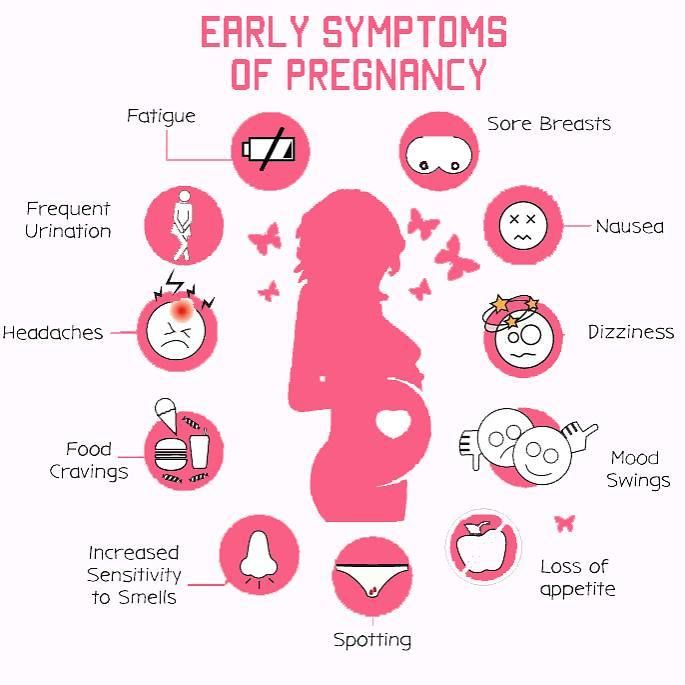
Two other common (and admittedly less pleasant) early signs of pregnancy are nausea and vomiting. One study found that 87.8% of women experienced these symptoms, so if you find yourself feeling queasy and physically sick, take comfort in knowing you’re not alone. You might have both symptoms at the same time, or only experience one. “Some people only feel nauseous, and some people vomit constantly,” says Dr. Celestine.
These signs of early pregnancy are most likely to appear after a missed period. “Nausea and vomiting are most commonly experienced at around seven to eight weeks,” she adds.
Food Aversion and cravings
Do you find yourself horrified at the thought of eating your usual lunchtime sandwich while also feeling a sudden and inexplicable craving for something you’ve never liked to eat before? Or perhaps it’s a strange new combination of foods that’s suddenly weirdly appealing. These are also common early signs of pregnancy to look out for. In the early days of pregnancy, around three weeks after conception, 54% of women experience food aversions, meaning you might have a more sensitive sense of smell or experience an aversion to certain food and drink.

You could also crave new foods that you wouldn’t usually eat — something that happens to 61% of women. Wondering if anyone else has experienced your immense and insatiable pregnancy craving for pickles? You can find out about the nine most common pregnancy food cravings here.
Missed Period
The most obvious early symptom of pregnancy — and the one that prompts most women to get a pregnancy test — is a missed period. But not all missed or delayed periods are caused by pregnancy.
Also, women can experience some bleeding during pregnancy. Early sign of pregnancy in 1 week If you are pregnant, ask your doctor what you should be aware of with bleeding. For example, when is bleeding normal and when is it a sign of an emergency?
There are reasons, besides pregnancy, for missing a period. it might be that you gained or lost too much weight. Hormonal problems, fatigue, or stress are other possibilities. Some women miss their period when they stop taking birth control pills. But if a period is late and pregnancy is a possibility, you may want to get a pregnancy test.
Increased urination
Feel like you need to pee a lot? If you’re visiting the bathroom more often than usual, including during the night, that could be an early sign of pregnancy discharge, urine. This is because you have increased blood levels during pregnancy. Your blood is filtered by your kidneys, which remove the extra waste fluid, which then leaves your body as urine. Basically, the more blood you have in your body, the more you will need to pee. This can happen as early as three weeks after conception, although Dr. Celestine explains that this symptom tends to be more noticeable in the third trimester because of “pressure on the bladder from the uterus, due to having a larger uterus and baby.”
Constipation
It might not be the most pleasant early sign of pregnancy discharge, urine, but you could find yourself becoming constipated as early as three weeks after conception. In fact, one study found that between 11% to 38% of pregnant people experienced constipation at some point in their pregnancy, usually around the third trimester. Again, you can likely thank a rise in progesterone for this one.
Less common early signs of pregnancy
While many of the very early signs of pregnancy are well known, there are some less obvious indications, too. Read on to find out more about unusual signs of early pregnancy.
Headaches
A headache might not be the most obvious sign of pregnancy, but it can be an early symptom. “Sometimes I’ve seen people have headaches early on. It can happen with hormone changes,” explains Dr. Celestine. The most common headaches associated with pregnancy are migraines and tension headaches. Research shows that tension headaches account for 26% of all headaches experienced during pregnancy, while up to 10% of pregnant women will experience a migraine without aura (a migraine with aura is where you also experience sensory symptoms such as flashes of light or blind spots).
A range of things can cause headaches during early pregnancy, including changing hormones, nasal congestion (more on that below), hunger, and low blood sugar levels. If you’re (understandably) struggling with pregnancy headaches, experts recommend trying some physical exercise, drinking lots of water, getting enough sleep, eating regularly, and practicing some relaxation techniques.
Nasal congestion
If you have a stuffy or runny nose, that could be because of a rise in hormone levels and blood production. This happens in pregnancy and can cause the mucous membranes in your nose to swell. Known as ‘rhinitis,’ around 39% of women experience it, and the main symptoms are sneezing, nasal congestion, and a runny nose. It can start at any point but should stop after you give birth. Keep that in mind when you’re buying your 150th multipack of pocket tissues at the grocery store.
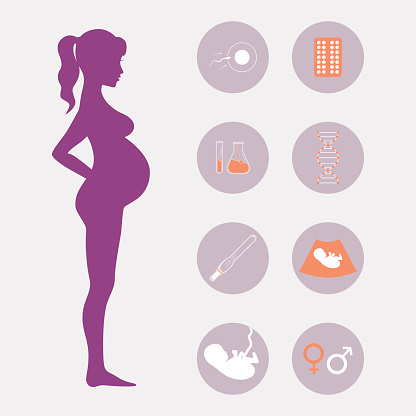
When is the right time to take a pregnancy test?
We know the wait between ovulation and taking a pregnancy test can feel long, and it can be tempting to take one straight away. If you’re worried about the idea of a possible pregnancy, waiting can undoubtedly be hard to do. However, a very early pregnancy can be difficult to detect with a home pregnancy test, and experts recommend you wait until the day after a missed period to make sure it’s more accurate.
Once you realize that you’ve missed your period, Dr. Celestine recommends taking a pregnancy test. She advises doing it first thing in the morning. “The urine pregnancy test needs a certain amount of the pregnancy hormone in order to register as positive,” she explains. The pregnancy hormone is called human chorionic gonadotropin (hCG), and it only develops in a woman’s body during pregnancy. Around 10 days after the egg is fertilized, this hormone starts to build up in the body.
“It comes out in your urine, so the first pee in the morning usually has the highest concentration of that pregnancy hormone because it builds up in your system all night,” explains Dr. Celestine. She explains that during the day, as you eat, drink, and urinate, your urine may be diluted. “So, the morning is the best time to do it, in 1 week especially if you’re testing early on in the pregnancy,” she says.
Is it possible to have early pregnancy symptoms and not be pregnant?
If you have symptoms that seem like the early signs of pregnancy, it doesn’t necessarily mean you are pregnant. Dr. Celestine says that there’s a lot of overlap with your period, for example. “A lot of times, PMS has similar symptoms – bloating, nausea, breast tenderness,” she explains.
Cramping or spotting could be symptoms of many things. “If you’re looking at cramping or spotting, it can even be an STI, an ovarian cyst, polyps [an overgrowth of tissue that’s usually benign] in the uterus, or fibroids on the uterus. Any other type of vaginal infection can also lead to spotting sometimes,” explains Dr. Celestine. “There are so many other things it could be. So if you’re ever concerned that it’s a pregnancy or you miss your period, I would take a pregnancy test and see a doctor.”
When is the right time to see the doctor about your early pregnancy?
If you take a pregnancy test at home and it’s positive, give your doctor a call (or find a doctor if you don’t have one) and book an appointment to discuss prenatal care. Your first visit will usually be between six to 12 weeks pregnant, although the exact timing will depend on both your health needs and history, as well as your doctor’s care plan.
And what can you expect during this first visit? One of the most important things is to confirm that your growing baby has a healthy heartbeat, in 1 week which will be done by either an ultrasound or by listening with a handheld doppler. But keep in mind that even an ultrasound can’t visualize a baby until around six to eight weeks, so don’t panic if this doesn’t happen before then.
If, however, you have a missed period, but a pregnancy test is negative, Dr. Celestine recommends waiting a week and doing another one. After that, if you haven’t had your period and a pregnancy test is still negative, she advises seeing a doctor to find out what’s going on. “That’s as long as you’re feeling fine,” she says, adding that you should see a doctor if you’re in severe pain or have concerns.
If you’d been hoping for a positive pregnancy test, try not to be too disheartened. It’s totally natural to feel disappointed but remember that around 85% of people will conceive within the first year of trying, so try to focus on your next cycle. If you feel like you’ve had a lucky escape with a negative pregnancy test, it might be a sign it’s worth rethinking your contraceptive method.
Early pregnancy signs: The takeaway
As we’ve seen, there are lots of different early pregnancy signs and symptoms, and of course, it can vary a lot between different people. That said, a missed period is often the first sign, followed by symptoms such as vomiting, in 1 week nausea, and breast tenderness.
If you’re concerned about a missed period or any other symptoms that could potentially be an early sign of pregnancy discharge urine, it’s a good idea to take a pregnancy test and speak to a health care professional.
Other Early Symptoms of Pregnancy
Pregnancy brings changes in your hormonal balance. And that can cause other symptoms that include:
Frequent urination. For many women, this starts around the sixth or eighth week after conception. Although this could be caused by a urinary tract infection, diabetes, or using diuretics, if you’re pregnant, it’s most likely due to hormonal levels.
Constipation. During pregnancy, higher levels of the hormone progesterone can make you constipated. Progesterone causes food to pass more slowly through your intestines. To ease the problem, drink plenty of water, exercise, and eat plenty of high-fiber foods.
Mood swings. These are common, especially during the first trimester. These are also related to changes in hormones.
Headaches and back pain. Many pregnant women report frequent mild headaches, and others experience back pain.
Dizziness and fainting. These may be related to dilating blood vessels, lower blood pressure, and lower blood sugar.
A pregnant woman could have all of these symptoms, or maybe have only one or two. If any of these symptoms become bothersome, talk with your doctor about them so you can make a plan to offset them.
Classic signs and symptoms of pregnancy
The most common early signs and symptoms of pregnancy might include:
- Missed period. If you’re in your childbearing years and a week or more has passed without the start of an expected menstrual cycle, you might be pregnant. However, this symptom can be misleading if you have an irregular menstrual cycle.
- Tender, swollen breasts. Early in pregnancy hormonal changes might make your breasts sensitive and sore. The discomfort will likely decrease after a few weeks as your body adjusts to hormonal changes.
- Nausea with or without vomiting. Morning sickness, which can occur at any time of the day or night, often begins one to two months after you become pregnant. Early sign of pregnancy in 1 week However, some women feel nausea earlier and some never experience it. While the cause of nausea during pregnancy isn’t clear, pregnancy hormones likely play a role.
- Increased urination. You might find yourself urinating more often than usual. Early sign of pregnancy discharge urine the amount of blood in your body increases during pregnancy, causing your kidneys to process extra fluid that ends up in your bladder.
- Fatigue. Fatigue also ranks high among early symptoms of pregnancy. No one knows for certain what causes sleepiness during the first trimester of pregnancy. However, a rapid rise in the levels of the hormone progesterone during early pregnancy might contribute to fatigue.
Other signs and symptoms of pregnancy
Other less obvious signs and symptoms of pregnancy that you might experience during the first trimester include:
- Moodiness. The flood of hormones in your body in early pregnancy can make you unusually emotional and weepy. Mood swings also are common.
- Bloating. Hormonal changes during early pregnancy can cause you to feel bloated, similar to how you might feel at the start of a menstrual period.
- Light spotting. Light spotting might be one of the first signs of pregnancy. Known as implantation bleeding, it happens when the fertilized egg attaches to the lining of the uterus — about 10 to 14 days after conception. Implantation bleeding occurs around the time you would expect to have a menstrual period. However, not all women have it.
- Cramping. Some women experience mild uterine cramping early sign of pregnancy in 1 week.
- Constipation. Hormonal changes cause your digestive system to slow down, which can lead to constipation.
- Food aversions. When you’re pregnant, you might become early sign of pregnancy discharge more sensitive to certain odors and your sense of taste might change. Like most other symptoms of pregnancy, these food preferences can be chalked up to hormonal changes.
- Nasal congestion. Increasing hormone levels and blood production can cause the mucous membranes in your nose to swell, dry out and bleed easily. This might cause you to have a stuffy or runny nose.
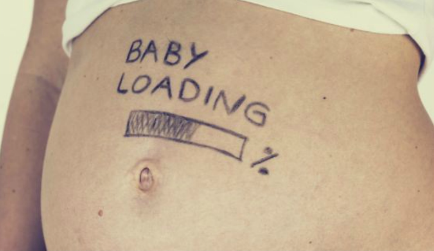
Are you really pregnant?
Many of these signs and symptoms aren’t unique to pregnancy. Some can indicate that you’re getting sick or that your period is about to start. Likewise, you can be pregnant without experiencing many of these symptoms.
Still, if you miss a period and notice some of the above signs or symptoms, take a home pregnancy test or see your health care provider. If your home pregnancy test is positive, make an appointment with your health care provider. Early sign of pregnancy in 1 week urine discharge the sooner your pregnancy is confirmed, the sooner you can begin prenatal care.
If you’re planning to conceive or just learned you’re pregnant, start taking a daily prenatal vitamin. Prenatal vitamins typically contain important vitamins and minerals. Early sign of pregnancy in urine 1 week such as folic acid and iron, to support your baby’s growth and development.






